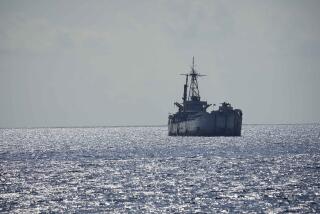Manila Lashed for Stand on Bases : Diplomacy: A bitter mood pervades talks on the U.S. military presence. The White House sends a message of frustration.
- Share via
MANILA — White House special negotiator Richard Armitage delivered a stinging rebuke to the Philippine government Wednesday, angrily warning against “anti-Americanism” at a time when U.S. soldiers are preparing for war.
Armitage, opening the fourth round of talks on the future of six U.S. military facilities here, declared “irreparable harm could be done to our relationship” by the increasingly bitter negotiations.
Armitage told Philippine Foreign Minister Raul Manglapus: “Please consider the message you are sending as it is perceived by President Bush and the U.S. Congress: As Americans prepare to fight and die in the Middle East, Filipinos define their own victory in terms of how many and how quickly U.S. forces can be removed from their country.”
“Is this the message the Philippines really intends to send?” he asked. “We don’t think so, but we can assure you that this is exactly the message our political leaders have perceived.”
The remarks appeared to be the harshest public criticism to date of President Corazon Aquino’s government from a senior U.S. official. Other U.S. officials said privately that it reflected growing frustration in the White House and Congress over what is seen as Philippine intransigence and lack of support during a critical period for the United States.
Aquino had no immediate reply, her spokesman, Horacio Paredes, said. “I’m sure they’re discussing it now at the Cabinet meeting,” he added.
Armitage also criticized Manila’s demand that all U.S. forces and operations be removed from Clark Air Base, Subic Bay Naval Base and four smaller installations within five years after the current lease expires in September, 1991. The United States has proposed a “phase-down” of forces over 10 to 12 years, retaining access and several thousand troops there.
“If the Philippines wants the phasing-down of U.S. forces to end with a ‘terminal phase-out,’ we presume you would want this to happen in a way that is not interpreted by the U.S. public as an act of anti-Americanism,” he said.
Philippines spokesman Rafael M. Alunan III later dismissed Armitage’s remarks as “all part of the U.S. strategy” in the talks. “The statement we’ve taken an anti-American stand is not only unwarranted, but unfair,” he said.
“The very fact we’ve sat down to talk . . . is a concession to the Americans,” Alunan said.
Although Manila has sent no troops, he said is is not true that the Philippines has not supported President Bush or the multinational military presence in the Persian Gulf. He said that at least 400,000 Philippine civilians are in Saudi Arabia.
“I think many people forget we have 400,000 Filipinos in the Mideast, and many of them are in the front lines, even further to the front than many U.S. military units,” Alunan said. “Insofar as Desert Shield is concerned, I don’t think we can be faulted.”
Government officials previously have cited the presence of so many Filipino civilians in the gulf region to explain why Aquino has never publicly denounced Iraq’s invasion of Kuwait or offered public or private support to President Bush or the military build-up.
Although the Philippines has said it will honor all United Nations resolutions regarding Iraq, U.S. officials here privately complain that Aquino’s government rebuffed repeated American requests that it join in U.N. Security Council debates condemning Iraq last fall.
The Philippines sent 200 doctors, nurses, dentists and other medical personnel to Saudi Arabia in mid-December after the Saudi ambassador and a special delegation from Kuwait’s exiled government pleaded for a show of support.
Last week, the Subic Bay Naval Base was host port to 13 U.S. warships and the 5th Marine Expeditionary Brigade from Camp Pendleton, Calif., part of a massive amphibious task force headed for the Persian Gulf. The U.S. Navy announced the visit, publicizing use of military facilities here for the first time since the Persian Gulf crisis began.
At the press conference, Alunan said the talks “remain deadlocked” over issues such as Manila’s demand for full legal jurisdiction over U.S. servicemen. U.S. Embassy spokesman Stanley Schrager, who read Armitage’s statement to reporters, denied that the talks are deadlocked but said U.S. negotiators consider the issue of criminal jurisdiction to be non-negotiable.
In his statement, Armitage said he was “unhappy” at Alunan’s statement Tuesday, when he said that U.S. actions on the bases did not “match rhetoric.”
“Such a comment seems inappropriate to us at the time when the United States is on the verge of a major sacrifice in the Persian Gulf in the defense of fundamental principles that affect the entire international community,” Armitage said.
More to Read
Sign up for Essential California
The most important California stories and recommendations in your inbox every morning.
You may occasionally receive promotional content from the Los Angeles Times.














